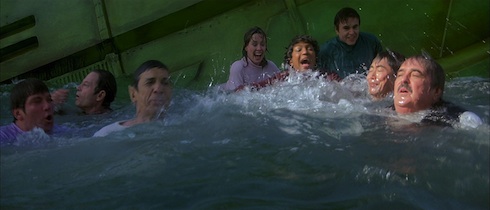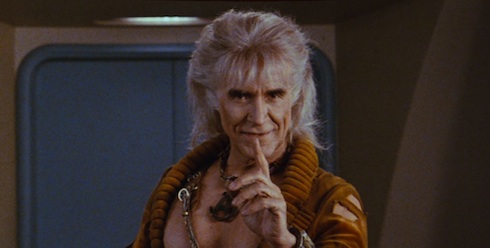Over the weekend, subspace chatter revealed that J.J. Abrams and company are interested in casting Benicio Del Toro in the next Star Trek film. But who will Benicio be playing? The good money would seem to be on “the villain” with some speculation leaning toward that villain being none other than Khan Noonien Singh! Mr. Del Toro certainly has the chops for such a role, but before the Wrath of Benicio descends upon us, perhaps we should consider if a villain-central Star Trek film is even the right decision at all. Casting questions about villains are certainly fun to think about, but in terms of Star Trek, it’s kind of sad that this is what it’s come down to.
Asking “who’s the new villain” is the wrong question. The right question is: “what will the interesting science fiction premise be?”
At the beginning of the justly derided Star Trek: Insurrection, Captain Picard briefly complains that the Enterprise no longer seems to be on a mission of exploration, but rather constantly running intergalactic chores for the Federation. I always took this as one of those meta-fictional moments where Picard the character had become self-aware and was like, “Get me out of this terrible movie! Let me get back to meeting interesting aliens and solving ethical dilemmas without pointing a gun at somebody!” I am certainly not the first to point out the inconsistencies in tone between the more contemporary Star Trek films and the various TV programs from which they derive. Red Letter Media’s tongue-in-cheek Plinkett reviews constantly illustrate the fact that things that happen in the TNG films would never happen on the TV show. Specifically noting that Picard is a raving lunatic killer in the films as opposed to the enlightened thoughtful person from the series.
But the 2009 Star Trek movie fixed this, right? Well, not really. At its core Trek ’09 has the same basic plot conflict as Star Trek: Nemesis. Despite being a much better film in almost every single way, the premise still boils down to fairly uninteresting baddie with a doomsday device that’s going to destroy Earth. Looked at from this angle, the climax of every single Trek film from Generations until now all have the same elements of the big climax of the James Bond film, GoldenEye. You’ve got usually two to three guys fighting on some kind of raised platform either outdoors or inside of a spaceship that is really big so they can jump around a lot.
In Generations there was a missile that needed to be stopped, in First Contact a spaceship was going to be blown up, and in Insurrection, Nemesis and Star Trek ’09 a planet was going to be destroyed. From a unique science fiction angle, GoldenEye is actually a more interesting movie because the doomsday weapon was going to knock out all electronics in a specific target zone. There was a suprising bit of science fiction social commentary going on with the GoldenEye satellite. Are we too reliant upon our technology? Is a weapon that destroys our technology more dangerous than a big bomb? And while this is not a remotely complex metaphor or plot concept, it is more thoughtful than “red matter.”

Anyway, many people will tell you this is neither here nor there because apparently everyone agrees Star Trek was a solid action movie. This is probably true. But honestly, who cares? As a kid I didn’t get into Star Trek for all the badass action. If that were the case, I’d be a fan of violent movies, which I’m not. Now, I’m guessing most Star Trek fans are with me when I say that the Star Trek movie that is most in the spirit of ALL the TV shows is The Voyage Home. This movie has a fun science fiction premise and is totally something the shows would want to do, but couldn’t because the scope of it is too large. And what’s the best part of The Voyage Home? There’s NOT A VILLAIN.
Sure, The Wrath of Khan is arguably the best Trek movie, and it is all about a villain. But at least The Wrath has an interesting science fiction premise thanks to the Genesis Device. Without those scientists on Regula I, the entire plot of Wrath doesn’t happen. The interesting science fiction premise drives this movie. And yes, though the movie is really about Khan, Kirk, and Spock, it’s not super transparent about it. Star Trek ’09, while very fun to watch, doesn’t even bother with originality. A boring villain is literally driving the plot of the movie by plowing his spaceship through time and space while blowing everyone up. (Eric Bana is a fine actor, he just wasn’t given a good role here. He, like Ewan McGregor in the Star Wars prequels, does his best with awful, awful lines.) In terms of understanding the Trek rebooted universe, Nero is the most important person in the whole of creation!
Was a revenge-driven bad guy the best they could come up with for explaining the existence of a parrellel dimenison? Nero is a thinly written character who seems to want revenge on Spock for no good reason at all. Spock did TRY to help, so why did Nero go batshit? And I don’t think the answer to this question should be: read the companion comic books Nero or Countdown. If your villain is going to drive your movie, the villain should be at least coherent. Now, I can already hear the arguement that Trek’09 was “about” the good guys and not “about” Nero, so I should just relax. And while I can sort of accept this (it’s still not a reason for lazy writing) Nero sets up a pretty bad model for how the writers think about the structure of these stories. Wrathful bad guy? Check. Doomsday weapon? Check. That’s how people like their Star Trek movies, right?
But wait, the top box office grossing Star Trek film, prior to the new one was The Voyage Home. Remember? The one with the whales that doesn’t end with a big battle, and instead features the crew jumping into water and splashing each other while laughing and having a good time.

I’m not saying new Star Trek is a lost cause. Robert Orci and Alex Kurtzman are big fanboys so they probably know that what has made Star Trek great in the past is good science fiction writing. The 1960s Star Trek had top SF writers doing scripts for the show. Names like Theodore Sturgeon, George Clayton Johnson, Harlan Ellison, Dorothy Fontana, and more! The Next Generation actually accepted spec scripts while it was on the air, and a hot young writer named Ronald D. Moore found his way into the industry from selling one of his scripts to Trek. An established writer named Nicholas Meyer helped save Wrath and also contributed story elements to three subsequent Trek films. All of these writers had good ideas, and weren’t necessarily looking to make a crowd pleaser; they were looking to tell a story.
Again, I don’t think the creative team behind the new era of Star Trek are hacks. It’s just in almost every single interview; they discuss or mention things about the possible villain for the movie. It’s as if they and many fans can’t conceive of a science fiction plot without a villain. Who is the villain in “City on the Edge of Forever?” What about the TNG episode “Darmok?” Or the DS9 episode “Far Beyond the Stars?” How about the Voyager episode “Blink of an Eye?” Hell, if we’re talking about a character piece; who is the villain in “Amok Time?”
We’re constantly being reassured that Abrams is “waiting on a good script” and that the whole enterprise wasn’t going to go forward without everything be just right. Meanwhile, the cast members seem to have just as many opinions as the fans. Zoe Saldana wants Uhura to “kick some ass.” Several months ago, Simon Pegg wanted Nick Frost to play Harry Mudd. None of this should matter at all and is just mindless prattle. We shouldn’t care if Benecio is playing Khan or not. I mean, what if it turns out he’s playing Lt. Arex, the three-armed navigator from the animated series? Would you be disappointed?
You shouldn’t be. Because all that should matter is an awesome and original science fictional premise. They made a crowd pleaser last time, this time it should be something more thoughtful.
In short, they should make Star Trek.
Ryan Britt is the staff writer for Tor.com.










